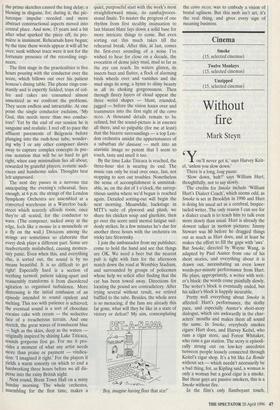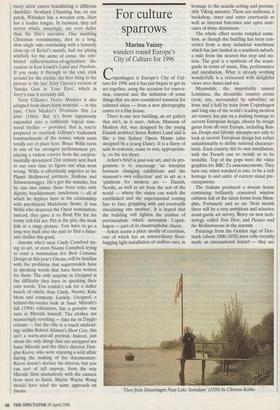Cinema
Smoke
(15, selected cinemas)
Twelve Monkeys (15, selected cinemas) Unzipped (15, selected cinemas)
Without fire
Mark Steyn
You'll never get it,' says Harvey Keit- el, 'unless you slow down.'
There is a long, long pause.
`Slow down, huh?' says William Hurt, thoughtfully, not to say slowly.
The credits for Smoke include 'William Hurt's Dialect Coach', which seems odd, as Smoke is set in Brooklyn in 1990 and Hurt is doing his usual act as a cerebral, bespec- tacled writer. The only reason I can see for a dialect coach is to teach him to talk even more slowly than usual. Hurt is already the slowest talker in motion pictures: Jimmy Stewart was 80 before he dragged things out as much as Hurt does, and at least he makes the effort to fill the gaps with `aws'. But Smoke, directed by Wayne Wang, is adapted by Paul Auster from one of his short stories, and everything about it is drawn out, necessitating an even lower words-per-minute performance from Hurt. He plays, appropriately, a writer with writ- er's block: the words come painfully slowly. The writer's block is eventually ended, but his talker's block is happily incurable.
Pretty well everything about Smoke is affected: Hurt's performance, the slothy pace, and especially Auster's short-story dialogue, which sits awkwardly in the char- acters' mouths and makes them all sound the same. In Smoke, everybody smokes cigars: Hurt does, and Harvey Keitel, who runs a cigar store, and Forest Whitaker, who runs a gas station. The story is episodi- cally strung out on low-key anecdotes between people loosely connected through Keitel's cigar shop. It's a bit like La Ronde without sex — which needn't necessarily be a bad thing, for, as Kipling said, a woman is only a woman but a good cigar is a smoke. But these guys are passive smokers, this is a Smoke without fire.
In the film's only flamboyant touch, every actor enters brandishing a different disability: Stockard Channing has an eye patch, Whitaker has a wooden arm, Hurt has a leaden tongue. In between, they tell stories which, amazingly, are even duller than the film's narrative. One numbing Christmas reminiscence, shot in a long, slow single take concluding with a leisurely close-up of Keitel's mouth, had me pining wistfully for the acme of ennui, the cele- brated collectivisation-of-agriculture dis- cussion in Ken Loach's Land and Freedom. If you make it through to the end, stick around for the credits: the best thing in the picture is the late Jerry Garcia's version of `Smoke Gets in Your Eyes', which in Jerry's case it certainly did.
Terry Gilliam's Twelve Monkeys is also adapted from short-form material — in this case, Chris Marker's 29-minute film La Jet& (1964). But it's been ingeniously expanded into a ruthlessly logical time- travel thriller — provided, that is, you're prepared to overlook Gilliam's trademark bombardments of the senses, which seem totally out of place here. Bruce Willis turns in one of his strongest performances yet, playing a violent convict from the environ- mentally devastated 21st century sent back to our own time to figure out what went wrong. Willis is effortlessly superior to his Planet Hollywood partners, Stallone and Schwarzenegger. He's got the muscles, but he can also imbue those bozo roles with dignity, bewilderment, tenderness — all of which he deploys here in his relationship with psychiatrist Madeleine Stowe. It was Willis who deserved the Oscar nomination; instead, they gave it to Brad Pitt for his loony rich kid act. Pitt is the pits, the weak link in a zingy picture. You have to go a long way back into the past to find a futur- istic thriller this good.
Anyone who's seen Cindy Crawford try- ing to act, or even Naomi Campbell trying to read a nomination for Best Costume Design at this year's Oscars, will be familiar with the problems that supermodels have in speaking words that have been written for them. The only surprise in Unzipped is the difficulty they have in speaking their own words. You couldn't ask for a duller bunch of chicks than Cindy, Naomi, Kate Moss and company. Luckily, Unzipped, a behind-the-scenes look at Isaac Mizrahi's fall (1994) collections, has a genuine star turn in Mizrahi himself. The clothes are reassuringly revolting — fake fur in Dayglo colours — but the title is a touch mislead- ing: unlike Robert Altman's Short Cuts, this isn't a warts-and-all portrait. Indeed, just about the only things that are unzipped are Isaac Mizrahi and the film's director Dou- glas Keeve, who were enjoying a wild affair during the making of the documentary. Keeve doesn't declare his interest, but you can sort of tell anyway, from the way Mizrahi flirts shamelessly with the camera from start to finish. Maybe Wayne Wang should have tried the same approach on Smoke.



































































 Previous page
Previous page